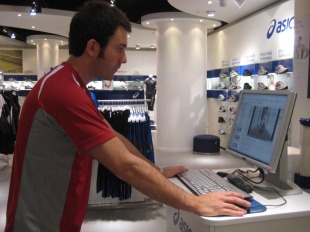
What decisions go into choosing your next pair of running shoes? The brand? The style? The colour? Of course comfort should be a major factor, but unlike Cinderella and her glass slippers, ASICS believe the perfect trainers might just surprise you.
Using the latest technology, ASICS uses a 3D foot mapping system alongside a gait assessment to ascertain the right pair of trainers, which can help prevent serious injury.
The ASICS store in central London is one of only three stores worldwide with the 3D foot scanner, which maps the shape and size of an individual's foot. Lasers and microcameras help establish accurate measurements, angles and axes to allow the qualified staff to choose the right trainer for an individual.
The foot scan works in tandem with the gait analysis to assess an individual's running style and find the trainer to suit an individual's running style. Every foot is different - even a pair of feet are not identical - and every individual has their own running style.
The rolling movement of the foot during transition is important to determining the best shoe, and the majority of people overpronate - meaning their foot rolls inwards. Only 10 percent of runners supinate - the outward rolling of the foot, while a similar proportion is neutral. Both excessive pronation or supination can cause serious joint injuries.
Most injuries can be attributed to running style - whether an individual overpronates or supinates, if the feet are not perfectly aligned to the knees, and correspondingly the hips, then the constant impact can cause pain.
ASICS design shoes to suit each type of runner, with the Cumulus and Nimbus ranges are geared towards neutral, while the Kayano series is designed for overpronators - to help align the foot and ankle on impact.

The gait assessment takes place on a treadmill and I was asked to run for 30 seconds in my old running shoes - veterans of over 1000 miles. ASICS superior Kiko Roca Taberner, videoed my feet, and replayed the footage in slow motion.
The software allowed Kiko to assess my running style and foot angles to recommend a suitable trainer. As an overpronator he recommended the Kayano range.
As a mild overpronator, my foot rolls inwards, putting excessive pressure on the ball of my foot , requiring a stable shoe with extra support. Upon trying each new pair, I would return to the treadmill and Kiko would assess the video evidence.
At the fifth attempt, I tried the 2150 - a structured cushioning shoe for an overpronator.
While most other shoe purchases require a shoe to 'feel right' before you part with your hard-earned cash, it is not always love at first sight for the perfect running shoe - the 'right' shoe might feel the completely 'wrong' at first.
"It often takes three weeks to get used to the new shoe, and often feels really strange and uncomfortable at times," said store manager Danka Malicka.
"The ideal is to have as smooth a transition as possible between the heel and the front of the foot, but a different kind of support structure in the shoe will seem unnatural."
"It is really important for people like ourselves using this system we have a responsibility and if we are not sure we have to be honest," said Kiko."You have to just say, 'I am sorry, there is nothing we can do, 'and recommend they see a physio or a podiatrist.
"Whatever happens customers can always come back and we will assess them again. It is not possible only after ten or 15 minutes to get it spot on every time. We recommend customers take the trainers away give them two or three weeks to try them and give them time but if they are not happy we will try to help them "
ASICS running clinics are now travelling throughout the UK and Ireland. For more go to asics.co.uk'

